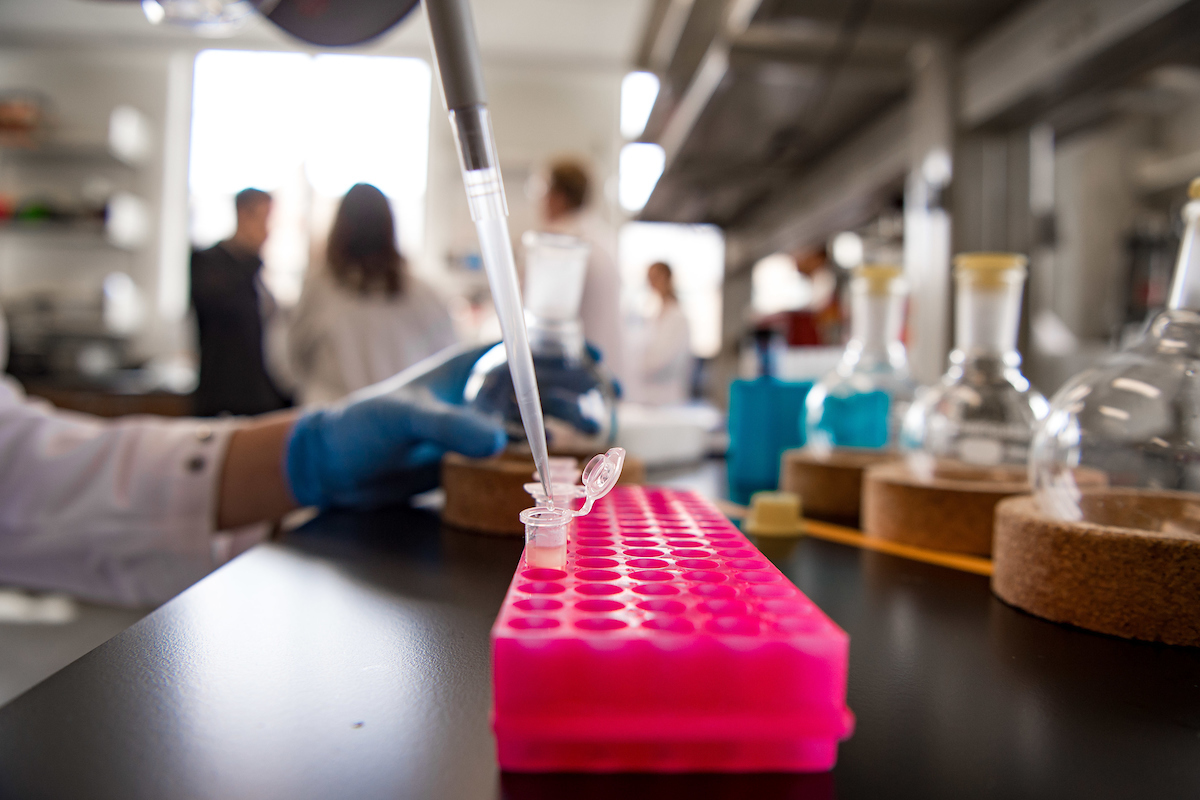Family’s $20M gift forms Notre Dame precision medicine institute
Subscriber Benefit
As a subscriber you can listen to articles at work, in the car, or while you work out. Subscribe Now
The University of Notre Dame has been working in the area of precision medicine for more than a decade, but a recent $20 million gift is adding muscle to the effort, creating “a much larger impact than our footprint would ordinarily predict,” says Dr. Paul Bohn. He’s the director of the newly established Berthiaume Institute for Precision Health, made possible by the gift from a family with very little connection to the school—but a firm belief in Notre Dame’s ability to forward biomedicine, while also being “a force for good.”
Bohn describes precision medicine as delivering the right therapy to the right person at the right time, instead of a one‐drug‐fits‐all model. Precision health considers physiological or biomolecular factors—such as a person’s genetics or a tumor’s DNA—to determine a patient’s likelihood of responding to a particular treatment.
“[Precision health] is certainly on its way to revolutionizing medicine; I don’t know if it’s there yet—it may never get there. But it’s certainly true that it’s a completely new way of thinking about how to develop a therapeutic regimen,” says Bohn, “especially for complex diseases like cancer.”
The gift from Douglas and Diana Berthiaume is endowing the Berthiaume Institute for Precision Health, which was previously Notre Dame’s Advanced Diagnostics and Therapeutics Initiative, created in 2009.
Bohn says precision health typically focuses on genomic analysis, which involves studying a small portion of a patient’s DNA to look for specific regions of the genome that would indicate the likelihood of a positive response to a certain treatment.
“[Notre Dame] started out about a decade ago with the idea that the DNA problem was already pretty well in hand through work at other institutions, universities, etcetera,” says Bohn. “What wasn’t as well developed was all of the things that happen to the cellular machinery as the DNA is being expressed as a protein, and as the cell is being constructed.”
And that’s the area of precision medicine that Notre Dame is helping pioneer. Bohn likens it to tract homes that have identical exteriors, but are individualized on the inside with different paint colors, furniture and floor coverings.
“You would never find any two houses that are exactly the same, even though they all came from the same blueprint, which is the DNA. But that blueprint can be interpreted in wildly divergent ways at the individual level,” says Bohn. “Much the same goes on when our cells make proteins that carry out the work of the cell. They make proteins in a way that are highly individualistic, and our tools for understanding them are much, much less well developed than they are for the DNA itself.”
Bohn says Notre Dame “has a distinct strength” in building “powerful new tools that make a difference” in better assessing an individual’s cellular machinery; creating these tools will “add a layer of understanding and predictive power” in designing better therapies for individual patients. Bohn adds that the institute will be faithful to Notre Dame’s philosophy “to be a force for good in the world” by developing tools that are accessible for all, regardless of patients’ socioeconomic status, for example.
A key goal for the Berthiaume Institute is to be an engine for translational research, providing the building blocks for startups.
“It’s not just a discovery that makes a new company, but it’s a discovery that’s made in a supportive and nurturing environment with access to the right kinds of resources, such as CEO talent, venture capital and infrastructure to support the work,” says Bohn. “We hope to be a locus for a lot of activity in that realm in the future.”
The university says corporate partners also play an important role in the overall “bioanalytical ecosystem” at Notre Dame. Local and regional partners include Eli Lilly and Co., Corteva Agriscience, Indiana Biosciences Research Institute and AbbVie Inc. in Chicago.
“These companies have great scientists and do very sophisticated work, but they can’t do everything, so we try to be somewhat of a one-stop shop for the analytical expertise…that they may not have within their own laboratories,” says Bohn. “Those [expertise], in many cases, can really be transformative in…allowing a product line to go forward that was really stymied by a particular formulation issue, for example.”
Bohn says the institute will help create a community—already blossoming at Notre Dame—focused on solving scientific problems so the promise of biomedicine can be fully realized.
“[With Notre Dame’s decade of work in precision medicine], we’ve already put out a couple generations of students in the workforce, carrying forward this idea of applying precision measurements to further good biomedical practice,” says Bohn. “It’s the creation of that community that I think will be the long-standing contribution of the Berthiaume Institute.”
Bohn says the Berthiaume family requested proposals—very much like business plans—for the gift, and Notre Dame’s focus on forwarding biomedicine, educating future scientists and being “a force for good” appealed to the donors.
